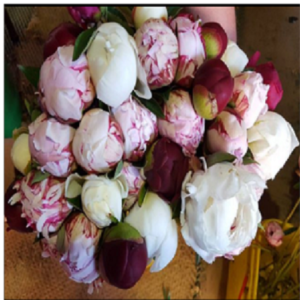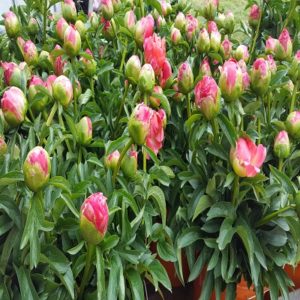Welcome to the World of Peonies! Discover the Beauty and Elegance of Peony Flowers.
Peonies, renowned for their exquisite beauty and lush blooms, captivate the hearts of flower enthusiasts around the globe. These perennial plants, belonging to the Paeoniaceae family, are cherished not only for their stunning appearance but also for their rich cultural significance. With a history dating back thousands of years, peonies have inspired artists, poets, and gardeners alike, earning a place as one of the most beloved flowers in the world.
Varieties of Peonies
Peonies come in a variety of types, each offering unique characteristics that appeal to different tastes and preferences:
- Herbaceous Peonies: These are the most common type, known for their bushy, herbaceous growth and large, often fragrant flowers. They bloom in late spring to early summer, bringing vibrant colors to gardens and landscapes.
- Tree Peonies: Tree peonies (Paeonia suffruticosa) are woody shrubs that produce large, showy flowers in shades ranging from delicate pastels to deep, saturated hues. They are prized for their longevity, with some specimens living for decades and becoming valuable heirlooms in gardens.
- Intersectional (Itoh) Peonies: A cross between herbaceous and tree peonies, intersectional peonies offer the best of both worlds: sturdy, herbaceous stems and large, colorful flowers that often feature intricate patterns and stunning color combinations.
Cultural Significance
Throughout history, peonies have held symbolic meanings in various cultures:
- Chinese Culture: In China, peonies symbolize wealth, honor, and prosperity. They are often referred to as the "king of flowers" and are highly prized in traditional Chinese art and literature.
- Japanese Culture: In Japan, peonies are associated with good fortune, bravery, and honor. They are a popular motif in Japanese tattoo art and are celebrated during the Hanami season.
- Western Culture: In Western cultures, peonies are symbols of romance, prosperity, and beauty. They are frequently used in bridal bouquets and as ornamental plants in gardens.
Growing and Caring for Peonies
Peonies are relatively easy to grow and care for, making them popular choices for both novice and experienced gardeners:
- Planting: Choose a sunny location with well-drained soil. Plant peony tubers (or root divisions) in the fall, making sure the eyes (buds) are no more than 2 inches deep.
- Watering: Water newly planted peonies thoroughly, and then water deeply but infrequently once established. Avoid overwatering to prevent root rot.
- Fertilizing: Apply a balanced fertilizer in early spring before new growth begins, and again after flowering to promote healthy foliage and blooms.
- Support: Herbaceous peonies may benefit from support cages or stakes to keep their heavy blooms upright.
Uses of Peonies
Peonies serve various purposes beyond garden beauty:
- Cut Flowers: Peonies make stunning cut flowers, often used in floral arrangements and wedding bouquets due to their large, fragrant blooms and long vase life.
- Medicinal Uses: In traditional medicine, peonies have been used to treat ailments ranging from headaches to menstrual cramps, although modern usage is more limited.
Whether you're a seasoned gardener, a flower enthusiast, or simply someone who appreciates natural beauty, peonies offer a delightful addition to any garden or floral arrangement. With their wide range of colors, shapes, and cultural significance, peonies continue to inspire and enchant people around the world. Explore the allure of peonies and bring a touch of elegance and grace into your life with these timeless flowers.
Secure your Peonies Now!
Order your peonies now! Our peony flowers are available for sale on our website and on Upstock from mid-October and mid December. We accept and deliver orders nationwide, except for rural areas. You can also avail our subscription service to receive your preferred peony flower varieties weekly or bi-weekly throughout the season, which is ideal for florists.



